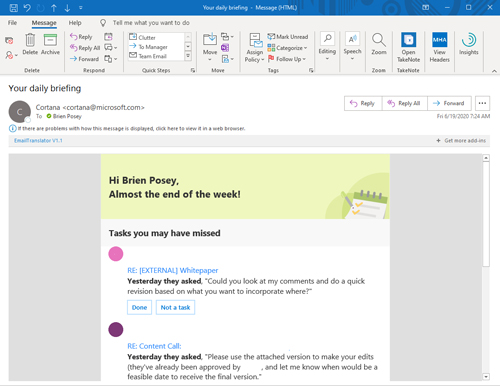Posey's Tips & Tricks
First Look: Microsoft Cortana's Daily Briefing in Outlook
With a new Cortana feature, Microsoft brushes off one of its old ideas for helping Outlook users stick to their tasks and answer their e-mails.
I receive dozens of e-mails on any given weekday, not counting the relentless flow of spam. While I do my best to keep pace with the inbound messages, some of them do occasionally slip between the cracks and go unanswered.
Fortunately, Cortana may be able to help with this problem.
I vaguely recall Microsoft once introducing an Outlook feature designed to nag you about incomplete tasks, but the feature never really caught on. Now, Microsoft is once again trying to help Outlook users stay on top of their otherwise neglected e-mail messages by providing users with a daily briefing.
The daily briefings were only recently introduced, and I have only been getting the briefings for just a week. Based on my experiences so far, though, the daily briefing e-mails do a surprisingly good job of calling out things that are actually important.
Before I delve too deeply into the daily briefings, let me show you what a daily briefing e-mail message looks like. Unfortunately, I had to redact portions of Figure 1 below because it was taken from my primary mailbox. Even so, I think there is still enough information there for you to get a good sense of what the daily briefings entail.
 [Click on image for larger view.] Figure 1: This is an example of a daily briefing message.
[Click on image for larger view.] Figure 1: This is an example of a daily briefing message.
As you can see in Figure 1, the daily briefing arrives in the form of an e-mail message from Cortana. This e-mail message is generated automatically. I didn't have to do anything to enable the daily briefings -- they just started showing up in my Inbox one day. Of course, if you prefer not to receive the daily briefings, then you can always create an Outlook rule to block messages from [email protected].
The thing that I like about the daily briefing e-mails is that they are short and to-the-point. In the case of Figure 1 above, Cortana alerted me to two tasks that needed my attention. In this particular case, both tasks are related to revisions.
One of the things I find interesting about the daily briefing is that it does more than just mining my Inbox for tasks. Apparently, Cortana actually understands my interactions with the people with whom I communicate (at least, to some extent). Think about it in the context of Figure 1. First, Cortana identified a couple of tasks that I was asked to complete. Second, Cortana checked for -- but has not found -- evidence that I've actually completed these tasks.
In case you are wondering, Cortana's assessment was correct. Both of the tasks that were identified within the daily briefing were indeed tasks that needed to be done, but that had not yet been completed.
Another thing I found to be useful about the daily briefing was that a couple of buttons appear after each task. One of these buttons lets you mark a task as being done so that Cortana doesn't nag you about it in the future. The other button lets you tell Cortana that the item identified isn't actually a task. Presumably, this option helps improve Cortana's accuracy in the future. In the time that I have been receiving these daily briefings, however, Cortana has yet to misidentify a task.
The only thing that I don't particularly like about the daily briefing is that in some ways the briefing makes it seem as though Cortana is setting arbitrary deadlines. The first task shown in Figure 1 needed to be completed within about a week, but the fact that it was listed in the daily briefing made it seem like it was something that needed to be completed today.
In any case, I don't expect the daily briefing to be perfect. It's a new technology and, like any other new technology, it will evolve and improve over time. In any case, I am impressed by how good of a job Cortana did at parsing my e-mail to determine what tasks have not been completed and need to be done.
About the Author
Brien Posey is a 22-time Microsoft MVP with decades of IT experience. As a freelance writer, Posey has written thousands of articles and contributed to several dozen books on a wide variety of IT topics. Prior to going freelance, Posey was a CIO for a national chain of hospitals and health care facilities. He has also served as a network administrator for some of the country's largest insurance companies and for the Department of Defense at Fort Knox. In addition to his continued work in IT, Posey has spent the last several years actively training as a commercial scientist-astronaut candidate in preparation to fly on a mission to study polar mesospheric clouds from space. You can follow his spaceflight training on his Web site.